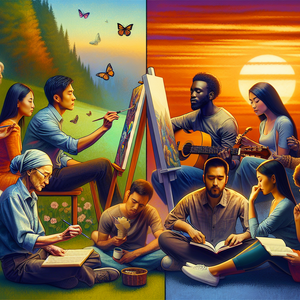The Future of Gaming Storytelling: Trends to Watch

One of the most significant trends in gaming narratives is the rise of interactive storytelling. Unlike traditional narratives, which follow a predetermined path, interactive storytelling allows players to shape the story based on their decisions and actions. Games like "Detroit: Become Human" and "The Walking Dead" series exemplify this trend, where player choices directly impact the storyline, character relationships, and even the game's outcome.
Emotional Engagement
This model not only enhances player engagement but also adds a layer of emotional investment. Players are more likely to feel connected to characters and the narrative when they have a say in how events unfold, making for a more personalized experience. For instance, in "The Walking Dead," players are faced with difficult moral choices that can lead to life-or-death consequences for characters they have grown to care about. As developers continue to experiment with branching narratives and multiple endings, the potential for varied gameplay experiences will only expand, inviting players to return to games to explore different storylines.
AI-Driven Narrative Design
Another exciting trend is the integration of artificial intelligence in narrative design. AI can analyze player behavior and preferences, allowing developers to create more adaptive and responsive storytelling experiences. For instance, AI algorithms can craft dialogues based on player choices, ensuring that interactions feel authentic and tailored to individual players.
Personalized Experiences
Games like "AI Dungeon" showcase the potential of AI-driven narratives, where players can engage in open-ended storytelling, experiencing unique adventures based on their input. These advancements in AI technology could lead to games where narratives evolve in real-time, creating an unprecedented level of immersion and unpredictability. This shift could revolutionize not just how stories are told but also how players interact with them, leading to experiences that feel genuinely personal.
The Role of Virtual and Augmented Reality
Virtual reality (VR) and augmented reality (AR) are also poised to change the narrative landscape in gaming. These technologies provide players with an immersive environment where they can interact with the story in ways that were previously unimaginable. In VR games, players can physically embody characters, making choices that affect their surroundings and the narrative flow.
Immersive Worlds
For example, "Half-Life: Alyx" utilizes VR to immerse players in a richly detailed world where their actions have immediate consequences, enhancing the storytelling experience. As VR and AR become more accessible, we can expect to see more titles that leverage these technologies to create deeply engaging narratives that blend gameplay with storytelling, providing players with a sense of agency and presence. This level of immersion not only deepens the player’s connection to the story but also opens up new avenues for storytelling techniques that blur the line between gameplay and narrative.
The Importance of Diversity in Narratives
As the gaming industry continues to grow, so does the call for diverse narratives that reflect a wider range of experiences and perspectives. Players are increasingly looking for stories that resonate with their identities, cultures, and life experiences. This demand has led to the emergence of games that tackle complex themes such as mental health, social justice, and identity.
Inclusive Storytelling
Titles like "Celeste," which explores anxiety and self-acceptance, and "Life is Strange," which addresses issues like LGBTQ+ representation and friendship, highlight the importance of inclusive storytelling in gaming. The future of gaming narratives will likely see an even broader range of voices and stories, enriching the medium and fostering empathy among players. As the industry evolves, the representation of diverse experiences not only broadens the appeal of games but also contributes to a more comprehensive understanding of the human experience.
The future of gaming storytelling is bright, marked by innovative trends that promise to redefine player experiences. From interactive storytelling that empowers players to shape narratives to AI-driven content that adapts to individual preferences, and the immersive potential of VR and AR, the possibilities are limitless. As the industry embraces diversity and inclusivity in narratives, we can look forward to a richer tapestry of stories that resonate with a global audience. The evolution of gaming storytelling is not just about technological advancements; it’s about creating meaningful experiences that connect players with the narratives they engage with, ensuring that the stories of tomorrow are as captivating and impactful as ever.
Narrative Designer
Naughty Dog, BioWare, Telltale Games
Job Description
Craft compelling narratives that align with gameplay mechanics and player engagement strategies.
Collaborate with writers, game designers, and artists to create branching storylines and character arcs.
Utilize knowledge of interactive storytelling techniques and player psychology to enhance emotional engagement.
Requirements
A degree in creative writing or game design.
Experience in game development.
Game Writer
Ubisoft, Square Enix, Insomniac Games
Job Description
Develop dialogue, character backstories, and in-game text that enrich the player experience.
Work closely with narrative designers and developers to ensure consistency in storytelling and character voice.
Participate in brainstorming sessions to generate innovative story ideas that align with game mechanics.
Requirements
Strong writing skills.
Familiarity with game design processes.
A portfolio showcasing previous work.
Interactive Experience Developer
Epic Games, Valve, Supermassive Games
Job Description
Design and implement interactive storytelling experiences using tools like Twine or Unity.
Collaborate with artists and programmers to create immersive environments that respond to player choices.
Analyze player interactions and feedback to continually improve narrative flow and engagement.
Requirements
Technical skills in coding and design.
A passion for storytelling.
AI Narrative Engineer
Electronic Arts, Ubisoft, independent studios specializing in AI innovations
Job Description
Develop AI-driven systems that generate dynamic narratives based on player choices and behavior.
Collaborate with data scientists and game designers to create algorithms that enhance storytelling experiences.
Test and refine AI systems to ensure they produce coherent and engaging dialogue and story developments.
Requirements
A background in computer science or artificial intelligence.
Experience in game design.
VR/AR Experience Designer
Oculus Studios, Niantic, Magic Leap
Job Description
Create immersive storytelling experiences in virtual and augmented reality environments.
Work with narrative designers to integrate interactive elements that enhance the overall story.
Design user interfaces and interactive mechanics that facilitate player engagement within VR/AR contexts.
Requirements
A degree in game design or a related field.
Experience in VR/AR development tools.


